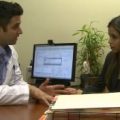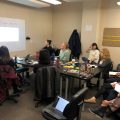
This post was written by Aubrey Hill, a former member of our team.
My favorite parts of my job are the moments where the connection between the people using the health care system and the work that we do becomes crystal clear. I had one of those moments this Monday at our CCMU luncheon thanks to our speaker, whose unique perspective grounded us in the most basic element in our work: our shared humanity.
Dr. Paul Browde visited from New York City, where he is a professor and psychiatrist, among many other things, to talk to us about the importance of storytelling in inspiring compassion. He explained that for health care providers and patients, storytelling can be used as a tool to bridge a divide developed out of fear or misunderstanding. Or, it could be used as a tool to more effectively work toward a solution to a difficult problem at hand. It can ease fears about a new diagnosis or help determine the best course of treatment.
Dr. Browde shared examples from his worldwide travels that demonstrate the power of storytelling. One story came from a Kenyan woman diagnosed with HIV, who struggled with her family’s initial lack of acceptance but found a support group in her community who helped her find a way to cope. In sharing a very personal and emotionally painful story, she showed her vulnerability and humanness, and the crowd immediately empathized with her pain.
Storytelling helps us to feel connected to one another and reduce the space between us. Health care providers who take the time to listen to their patients are reminded to address a patient’s humanity first and his or her list of symptoms and testing needs second. Listening also could reduce the patient’s anxiety as well as lessen misunderstandings between them. Understanding where the patient is coming from is essential to strong relationships within the health care system as well as successful treatment. Dr. Browde wisely said, “[Providers] may be the experts in medicine, but patients are the experts in their own lives.”
Monday’s experience was a powerful one, underscoring that the most fundamental element in our work is the people we serve. Reflecting back on the day, I was reminded of what Archbishop Desmond Tutu once said: “My humanity is bound up in yours, for we can only be human together.” Indeed, we need to continue to remember the humans with whom we work and for whom we work, as that makes our connections stronger and our work truer.




